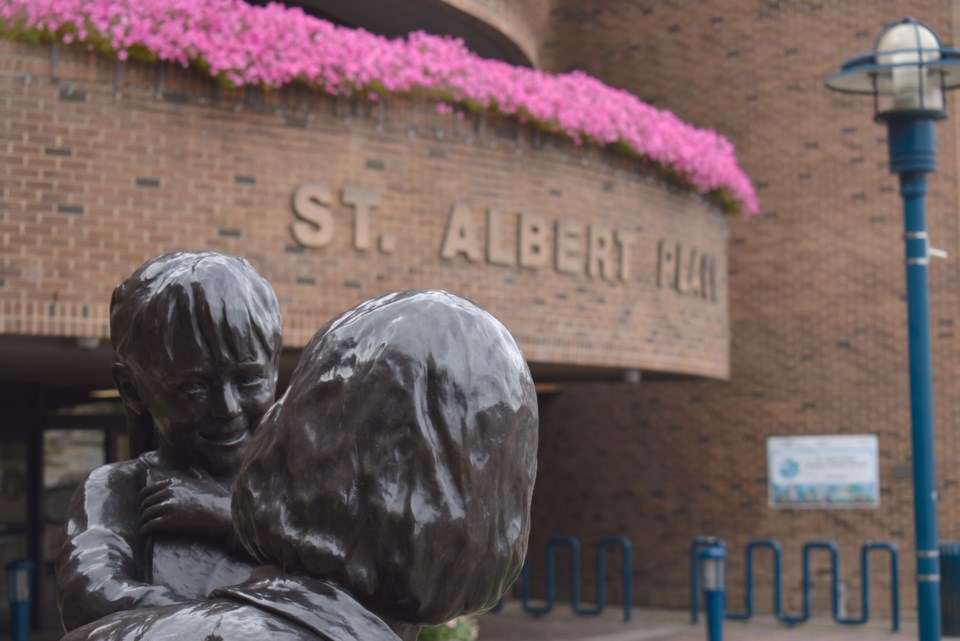The City of St. Albert is projecting a surplus of nearly $9 million for 2024, much of the savings caused by staff vacancies across the organization, from lifeguards to RCMP officers.
Delivering his Q3 update during city council’s regular Nov. 19 meeting, CAO William (Bill) Fletcher said the city now expects a surplus of $8.8 million for 2024. That was fuelled by revenue from high interest rates and permits/fees ($3.5 million) and savings on policing ($2.5 million) and ambulance ($600,000) contracts, and vacancies at the city ($2 million).
The city sees itself earning $3 million more than expected because of the Bank of Canada’s prime interest rate being higher than forecast and nearly $500,000 from the increase to the utility franchise fee approved earlier this year. The interest rate is a double-edged sword, however, as it is also blamed for $2 million in additional expenses.
The struggle to get St. Albert’s RCMP complement to its approved strength of 75 officers benefits the bottom line. According to Coun. Ken MacKay, council’s representative on the Policing Advisory Committee, the city is currently budgeting for 65 officers, but there are only 61 at the detachment.
“We have a number of people that are moving into positions,” MacKay said. “It’s a good-news story in relation to that, based on the fact that we just had a public release in relation to a serious number of break-ins in our community. It’s good that the numbers are getting up.”
Smaller pool, bigger audience
Community and Recreation Services is sitting $1.3 million below what the 2024 budget projected for this year, thanks to savings at the pool and robust sales at cultural attractions such as the Arden Theatre.
The Fountain Park Recreation Centre closure cost the city $70,000 in fees — it was more than that, but was offset by increases to programming at Grosvenor and Servus Credit Union Place — but the city expects to realize $890,000 in savings this year partly because of the closure and partly from staff vacancies in the broader recreation department.
At the Arden Theatre, the box office is booming. The department’s revenue projection now is $382,000 ahead of the budget thanks to $215,000 from an increase in recreation admission and membership revenue from higher usage, $134,000 from culture rental revenue, and the Arden refurbishment surcharge because of increased demand and $70,000 from recreation rental revenue from increased demand.
“We’ve had a significant growth in commercial rentals this year, not aligned with previous trends we’ve seen,” Elizabeth Wilkie, the city’s director of community services, said in response to a question from Coun. Sheena Hughes. She said the 2025 budget hasn’t been adjusted to expect that level of activity next year but could be nudged northward if the spike tables out.
The city also collected $66,000 more than expected in tax penalties and tax certificates because of higher volume, and $40,000 extra in business licence revenue for the same reason.
It spent $150,000 less than expected on learning and development “due to employee capacity constraints and an inability to take planned learning.”
Planning and engineering is also an even better earner than expected in 2024, as it projects landing $1.5 million ahead of budget thanks to $1.35 million more in building permits and inspections from growth, $156,000 in subdivision fees and $75,000 in development permit fees (also growth-driven), $100,000 in recovered costs from a third-party utility review and $151,000 in savings because of a trend toward title insurance in lieu of development compliance certificates.
The gains were offset by the bill for delivering electricity, mostly to street lighting, which was $247,000 higher than expected.
On the utility side, water revenues are projected to land $603,000 higher due to connection fees from development growth and expenses are to be $453,000 lower from a favourable water purchase rate from EPCOR.
Wastewater revenue will be $400,000 lower because of “system water losses not having been factored into projected wastewater volume and wastewater rates.”
Cash flow
As of Sept. 30, the city’s revenues and expenses are “on track” for three-quarters of the way through the year, according to Fletcher. The city recognized $159.5 million in revenue, 73 per cent of the budget forecast, and spent $143.2 million, 68 per cent of forecast.
The city has $296 million in cash and investments and has earned $8 million in investment income to date.
Perhaps ironically, the namesake of Servus Credit Union Place is one of the seven institutions handling St. Albert’s portfolio, but has by orders of magnitude the smallest piece of the pie, according to the Q3 report:
- CIBC: $91,037,834
- Scotiabank: $81,563,886
- BMO: $59,390,437
- CWB: $31,752,781
- RBC Commercial: $21,878,263
- NBC: $5,341,774
- HSBC: $5,059,897
- Servus: $200,001
The city has $188.4 million in reserves and $84.6 million in outstanding debt, “significantly lower than the municipal ceiling,” according to Fletcher’s report.
Fletcher said 91 per cent of the 158 capital projects on St. Albert’s books are in progress or are complete, while 53 are planned to be finished by the end of the year. Of that total, 149 projects are on budget and nine (including Millennium Park, which was halted by council) are below budget.




